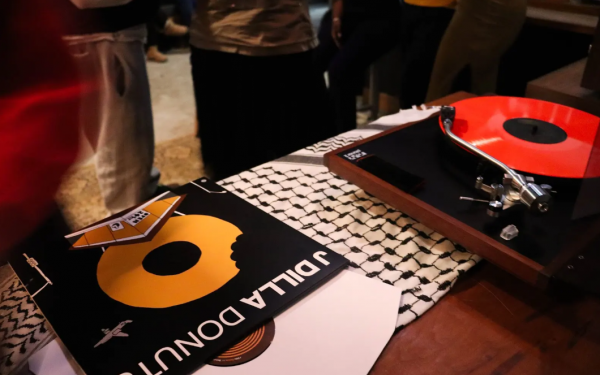FEUQ Elects New President
Desjardins and Genest-Grégoire Discuss Next Steps
After two years at the head of the Fédération Étudiante Universitaire du Québec, Martine Desjardins is stepping down.
She was replaced on May 1 by Antoine Genest-Grégoire—a masters student in economics and former president of the Université du Québec à Montréal’s Association étudiante – École des sciences de la gestion.
The FEUQ represents over 125,000 students from 14 student associations across Quebec, including the Concordia Student Union.
In an interview with The Link on Monday, Desjardins and Génest-Grégoire reflected on the FEUQ’s role over the past two years and discussed some of the upcoming challenges for the Quebec student movement.
Desjardins, who will be remembered for her role as FEUQ president in the 2012 student strike, said that she witnessed “enormous” change during her time at the federation.
“We changed our internal policies,” she said. “And we improved the links we have with our members.”
Desjardins also noted the FEUQ’s transformation from an organization that was not known for its ability to mobilize into a driving force of a large protest movement.
“We showed that we were able to do both political lobbying and mobilization in the street,” she said.
Since announcing her decision to step down, the former FEUQ president has been vocal in criticizing certain aspects of the Coalition large de L’Association pour une solidarité syndicale étudiante’s actions during the strike, including the coalition’s failure to immediately denounce violence at protests.
But Desjardins dismissed the idea that ideological divisions between the two groups could hurt the student movement.
“We shouldn’t be afraid to debate in public,” she said, adding that it is “normal” for the two organisations to be at odds. “When you don’t have the same principles, it’s difficult to show a united front.”
Genest-Grégoire’s presidency is likely to be a more peaceful one than Desjardins’, but will present a different set of hurdles.
“We’re no longer focused on one central campaign,” he said. “We now have a larger number of challenges, and we’re working on many different issues at the same time.”
Chantiers de travail
One area of focus is the FEUQ’s participation in the Ministre de l’Enseignement supérieur, de la Recherche, de la Science et de la Technologie’s chantiers de travail, the policy-planning committees created in the wake of February’s education summit to deal with various unresolved issues in higher education.
The work of the chantier on student financial aid is almost complete, and the FEUQ is awaiting the release of its final report to see which of its recommendations will be included.
The federation wants to increase how much students can earn with summer jobs without affecting their financial aid, and to raise the amount of money that students are given for living expenses.
“We’ve been waiting for this to change for a long time,” Genest-Grégoire said. “The government allots $7 a day for students to feed themselves. This amount is very, very out of date, so we’re going to try and raise it.”
The FEUQ is also trying to influence change in the chantiers concerning the drafting of a legal framework for universities and the formation of a council on universities, on which the FEUQ wants to see as much student representation as possible.
“We’re trying to protect everything in the category of accessibility and public financing,” said Desjardins. “We want to reform university management, and we can’t forget that students should be key players in that management.”
Both Desjardins and Genest-Grégoire said that they had faith in the Parti Québécois government’s good intentions for the chantiers, despite their disappointment the recent decision to index tuition fees to the cost of living, leading to a 2.6 per cent increase for the 2013-2014 academic year.
“At the moment, we’re getting good feedback; it’s an honest process,” said Genest-Grégoire of the chantiers. “Of course, the chantiers end up as reports, and the reports are supposed to end up influencing policy […]. When the policy comes out, that’s when we’ll know whether they were listening.”
Supporting Student Researchers
Also on the horizon is Quebec’s new research policy—the Politique nationale de recherche et d’innovation—which will be released in June. The FEUQ has been lobbying the government to make sure that student researchers get a fair shake in the new policy.
“A lot of research and innovation is propelled by graduate students,” said Genest-Grégoire. “It’s great to have grants for research but we should also have them for student researchers.”
Genest-Grégoire said that the Fonds de recherche du Québec, the province’s main funding body, turns away too many qualified students.
“There simply isn’t enough money,” he said. “The province needs to catch up to make sure that students can continue to graduate studies, to do research that moves Quebec forward.”
The FEUQ is also keeping an eye on the government’s possible plans to promote more research partnerships between universities and private industry in the new policy.
“We’re not against partnerships,” Desjardins said. “But we have to make sure that they’re fair to students, that they respect intellectual property and that the profits from the research don’t just go to the businesses.”
International Students
Though he admits that international tuition fees are often considered a “peripheral issue” in the funding debate, the FEUQ’s new president sees a need for change.
“What we’re seeing is essentially a deregulation of certain programs,” said Genest-Grégoire.
Although international rates are regulated, many programs are allowed to charge an unregulated supplementary fee that has put students, in Genest-Grégoire’s words, “at the mercy of administrators.”
Genest-Grégoire said the FEUQ would study the issue within the framework of the chantier on university funding.
Internal issues
Genest-Grégoire is taking the presidency at a moment when the FEUQ is under scrutiny for its centralized leadership style, both in the press and from a former member of its executive.
Genest-Grégoire said that the FEUQ wouldn’t respond to individual comments, but that it was taking its member associations’ concerns seriously.
“We had a mandate from our members to revise a portion of our internal processes,” he said. “That has already started in this past year, and it will continue in the year to come.”
“What matters to us is that students are satisfied with their organization, that it gives them results, that it provides them with something concrete, and at the same time, that they have a way to control it—that they can know where it’s going.”
Genest-Grégoire explained that he became familiar with the FEUQ’s policies and procedures over two years of participating in the federation’s congresses, but that in the past year, he “wanted to do even more, to go as far as I could with the organization.”
“It was a personal challenge, and also a way to put everything I’ve learned in theory into practice,” he said. “Economics is very abstract […]. Applying these principles to real public policy is a wonderful experience for me.”

_900_600_90.jpg)





_600_375_90_s_c1.jpg)